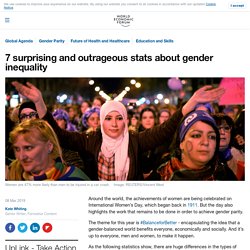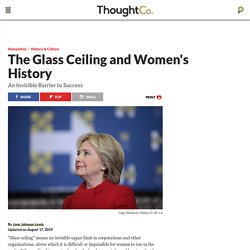

#Metoo: how it's changing the world. 7 surprising and outrageous stats about gender inequality. Around the world, the achievements of women are being celebrated on International Women’s Day, which began back in 1911.

But the day also highlights the work that remains to be done in order to achieve gender parity. The theme for this year is #BalanceforBetter - encapsulating the idea that a gender-balanced world benefits everyone, economically and socially. And it’s up to everyone, men and women, to make it happen. As the following statistics show, there are huge differences in the types of inequality faced by women in different parts of the world - from cultural representation, to domestic burdens and child marriage. But through collective action and shared ownership, change is possible. 1. In their 2011 study of more than 45,000 crash victims over 11 years, researchers from the University of Virginia found women drivers were much more likely to be injured in a crash than men. They said this was because car safety features had been designed for men. 3. 4. 5. 7. License and Republishing. Glass Ceiling: An Invisible Barrier to Success.
"Glass ceiling" means an invisible upper limit in corporations and other organizations, above which it is difficult or impossible for women to rise in the ranks.

"Glass ceiling" is a metaphor for the hard-to-see informal barriers that keep women from getting promotions, pay raises, and further opportunities. The "glass ceiling" metaphor has also been used to describe the limits and barriers experienced by minority racial groups. It is "glass" because it's not usually a visible barrier, and a woman may not be aware of its existence until she "hits" the barrier. In other words, it's not an explicit practice of discriminating against women — though specific policies, practices, and attitudes may exist that produce this barrier without the intention to discriminate.
The term was invented to apply to major economic organizations, like corporations, but later began to be applied to invisible limits above which women had not risen in other fields, especially electoral politics. Votes for Women - British Depth Study. Emma Watson at the HeForShe Campaign 2014 - Official UN Video. Emma Watson debuts inspirational short film Hurdles about equality for women.
Hillary Clinton's 'glass ceiling' moment. Hillary Clinton’s “glass ceiling” speech, the most memorable moment of oratory in her political career, once decisively marked the end of her presidential hopes; now, her supporters see it as an inspiring prelude.

Eight years to the day after she declared that, thanks to the number of Democrats who voted for her, the highest, hardest glass ceiling of sexism had "about 18 million cracks in it," Clinton is set to make history as the first woman to become her a major party nominee. Story Continued Below She will finally claim victory Tuesday night in her protracted and unexpectedly bitter fight against Bernie Sanders. And aides say she is likely to reference her own parting comments in the 2008 race, etched in pain but delivered with hope — aimed at restoring the party unity she now needs from the defiant Vermont Senator. “Life is too short, time is too precious, and the stakes are too high to dwell on what might have been," she said. Again, the moment resonates today. 7 Things To Know If You Think Women Are Equal To Men. Suffragettes. The Suffragettes wanted the right for women to vote.

The move for women to have the vote had really started in 1897 when Millicent Fawcett founded theNational Union of Women’s Suffrage. “Suffrage” means the right to vote and that is what women wanted – hence its inclusion in Fawcett’s title. Millicent Fawcett believed in peaceful protest. She felt that any violence or trouble would persuade men that women could not be trusted to have the right to vote. Her game plan was patience and logical arguments. However, Fawcett’s progress was very slow. In fact, the Suffragettes started off relatively peacefully. Both women refused to pay a fine preferring to go to prison to highlight the injustice of the system as it was then. Ited Nations: Gender equality and women's empowerment.